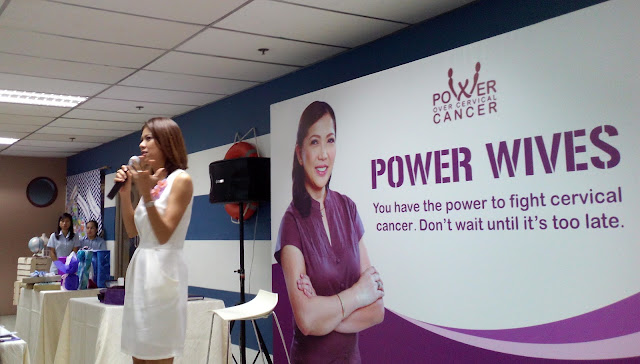Lung cancer is not just a smoker’s disease
(An educational article sponsored by MSD.)
Though the World Health Organization (WHO) has identified tobacco use as the cause of 70 percent of lung cancer deaths, those who do not smoke are equally at risk of developing the disease. A study conducted on Asian patients with advanced adenocarcinoma affecting the lungs has even shown that non-smokers have a higher chance of forming tumors compared with regular smokers.1
 According to the WHO, lung cancer is the leading cause of cancer deaths worldwide.2The same is true in the Philippines where it is the top cancer killer among Filipino men, and the second most common cancer killer among Filipino women.3 Aside from tobacco use, lung cancer may develop due to family history, exposure to industrial and chemical carcinogens, as well as indoor and outdoor air pollution. The WHO also identifies unhealthy habits as a leading cause of cancer.4
According to the WHO, lung cancer is the leading cause of cancer deaths worldwide.2The same is true in the Philippines where it is the top cancer killer among Filipino men, and the second most common cancer killer among Filipino women.3 Aside from tobacco use, lung cancer may develop due to family history, exposure to industrial and chemical carcinogens, as well as indoor and outdoor air pollution. The WHO also identifies unhealthy habits as a leading cause of cancer.4
“There is a popular notion that lung cancer is a smoker’s disease, but even those who are already leading healthy and active lifestyles may still be exposed to its other risk factors,” said Dr. Ena Ang of MSD Oncology. “That is why vigilance is necessary to protect ourselves against lung cancer.”
For smokers, quitting is the necessary first step to avoiding cancer. As for non-smokers, certain habits and practices can help minimize risk for the disease. Below are just some of these to ensure good lung health:
1. Avoid heavily polluted areas
Increased exposure to particulate matter and air pollution increases the likelihood of lung cancer, according to the International Agency for Research on Cancer (IARC). Particulate matter (PM) refers to a mixture of solid particles and liquid droplets found in the air, emitted from sources such as construction sites, power plants, industries, automobiles, and fireworks.5
If you work in or near areas that emit large volumes of PM, wearing protective equipment is advised. If you can’t avoid going to heavily polluted areas, you can wear a mask recommended or provided by your doctor.6
2. Keep indoor air clean
Indoor air pollution from solid fuels like wood, charcoal, and coal used for cooking causes approximately 17 percent of annual premature lung cancer deaths in adults, according to the WHO.7Households can reduce this risk by switching to cooking technologies that are safer to human health. Because homes are also susceptible to outdoor particulate matter due to air leaks, air purifiers are recommended to improve indoor air quality.8
3. Eat more fruit and vegetables
Diet plays a central role in keeping the body healthy against diseases, including cancer. Fruits and vegetables contain fiber, vitamins, minerals, and antioxidants that help fight off cancer, while diets heavy in protein and fat increase the risk for the disease.9Regular exercise, as well as abstinence from tobacco and alcohol, maximizes the benefits of a healthy diet.
4. Exercise more
According to the National Cancer Institute of the U.S. Department of Health and Human Services, physically active individuals have a lower chance of developing lung cancer by up to 20 percent.10If you already exercise regularly, it’s important to avoid working out in or near heavily polluted areas to keep your lungs safe and healthy.
5. Seek medical assistance for symptoms
In many cases, lung cancer is already in the advanced stages by the time it is diagnosed as the symptoms are often mistaken for common illnesses. An early symptom of the disease can be as simple as a cough. When you experience shortness of breath, chest pains, fatigue, and loss of weight and appetite, see a doctor right away. Coughing up blood is already a serious sign that could indicate advanced lung cancer.
Immediate diagnosis could prompt early action especially if the cancer is still in its early stages. This does not mean, however, that the disease is no longer manageable once it is already advanced. At this point, advanced treatment options are available to help in managing Stage 4 lung cancer to increase the rate of survival.
1 A
Prospective, Molecular Epidemiology Study of EGFR Mutations in Asian
Patients with Advanced Non–Small-Cell Lung Cancer of
Adenocarcinoma Histology
(2014)http://www.ncbi.nlm.nih.gov/pmc/articles/PMC4132036/
Accessed January 28 2016.
2
World Health Organization
http://www.who.int/mediacentre/factsheets/fs297/en/
Accessed January 28, 2016
3 Globocan
2012 http://globocan.iarc.fr/Pages/fact_sheets_population.aspx
Accessed January 28, 2016
4 World
Health Organization
http://www.who.int/mediacentre/factsheets/fs297/en/Accessed
January 28, 2016
5
United States Environmental Protection Agency
http://www3.epa.gov/airquality/particlepollution/basic.html
Accessed
January 28, 2016
6 Cleveland
Clinichttps://my.clevelandclinic.org/health/diseases_conditions/hic_Understanding_COPD/hic_Preventing_Respiratory_Infection_and_Avoiding_IrritantsAccessed
January 28, 2016
7 World
Health
Organizationhttp://www.who.int/mediacentre/factsheets/fs292/en/
Accessed January 28, 2016
8
Vijayan, V. K., Paramesh, H., Salvi, S. S., & Dalal, A. A. K.
(2015). Enhancing indoor air quality –The air filter advantage.
Lung India : Official Organ of Indian Chest Society, 32(5),
473–479. http://doi.org/10.4103/0970-2113.164174
9
Healwithfood.org http://www.healwithfood.org/lungcancer/diet.php
Accessed January 28,2016
10 National
Cancer Institute
http://www.cancer.gov/about-cancer/causes-prevention/risk/obesity/physical-activity-fact-sheet#q7Accessed
January 28, 2016


















